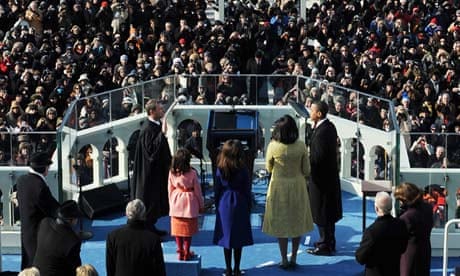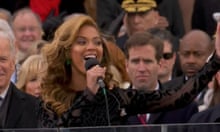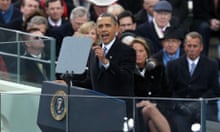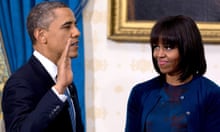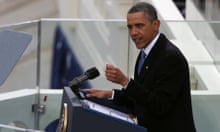America will on Monday witness its quadrennial act of political alchemy. The base metal of a previously partisan candidate is transformed by the incantation of a few, solemn words into gold, becoming not just a head of government but a head of state – the only figure capable of transcending low politics and representing the republic itself.
That, at least, is the idea. Inauguration day is when the American presidency is revealed as not merely an executive office – even if, still, the most powerful in the world – but also a kind of secular monarchy. On Monday the avowedly egalitarian United States – which rejected all things regal when it broke from the British mother-country, insisting its president be known not as His Majesty but as plain Mister – anoints its leader with as much ceremony and ritual as it can muster. The oath, the address, the anthem, the parade: all that's missing is the Queen's golden coach.
The magic is most visible with a new president. Second inaugurations are rare – Barack Obama is only the 16th person since George Washington to reach that milestone – but they lack the same alchemical grandeur. After all, the man placing his hand on the Bible – in Obama's case the copy that belonged to Dr Martin Luther King – has already been transformed once before. (That's not counting Sunday's private swearing-in.)
The goal of a second inaugural is to repeat the trick, to persuade Americans once again to see the man on the Capitol steps as the leader of the entire nation, not just one section of it. Throughout 2012, Obama was stuck in the bearpit of a hard-fought election campaign. The ceremony's purpose is to lift him out, dust him down and present him not as the Democrats' candidate, but as the nation's president.
In Obama's case, that's an especially tall order. The inauguration of 2009 had a romance not easily equalled, stemming chiefly from the historic first Obama represented. Everyone felt it, those wearing Obama's name or face on their hats or badges, the 1.8 million who braved snow and sub-zero temperatures to cram the National Mall, those like Robert Davis, an African-American man then aged 63 who had made the journey from Cincinnati, Ohio. "This moment won't come again," he told me then. "There may be another black American president, but this will always be the first time."
Even those presidencies that did not carry so great a weight of expectation, the promise of "hope and change", have struggled to relight the fire four years later. Most second inaugural speeches are swiftly forgotten – any takers for Bill Clinton's "one common destiny"? – with perhaps just two granted an enduring place in the collective American memory. Why most fail, and why those two succeeded, gives a useful guide for the task facing Obama just after noon US time on Monday.
Failure comes with any attempt to look backward, to defend the record of the first few years. Surprisingly, Thomas Jefferson is said to have made that mistake. Voters had their fill of that in the election campaign: now they want to know what's coming.
The usual path is to promise a new, united future, vowing to heal wounds of the past and usher in bipartisan co-operation on the big challenges facing the nation. The model here is what's deemed the greatest ever second inaugural address, that delivered by Abraham Lincoln, as he swore "to bind up the nation's wounds" after a civil war whose last dead had only just been buried.
The trouble for that speech's imitators is that when reaching for the same spirit of unity, they descend instead into platitude and banality. The alternative is the only other memorable second inauguration text, delivered by Franklin Roosevelt in 1937, when he combatively made the case against American poverty: "I see one-third of a nation ill-housed, ill-clad, ill-nourished."
This is what Obama's liberal supporters would like to hear, the Obama of their 2008 dreams, setting out the purpose of his second term and all but welcoming the opposition he is bound to face. The domestic agenda is clear enough. The Newtown massacre demands action on guns; immigration reform is long overdue; and looming over everything is the same problem that dominated his first term: the economy and the quest for jobs.
So far there have been signs of a new, more bullish Obama, now freed from the burden of seeking re-election. He held firm on his nomination of Chuck Hagel to head the Pentagon, despite pressure to drop him, and last week got congressional Republicans to blink first in a confrontation over raising the debt ceiling. His rhetoric is sharper, his willingness to blame the Republicans, rather than both sides, for their obstructionism greater too.
The Washington conventional wisdom is urging Obama to take the path of Lincoln on Monday and he will surely make all the right unifying noises. But FDR offered a different, no less compelling precedent, suggesting inauguration day can conjure a kind of magic – even the second time around.
